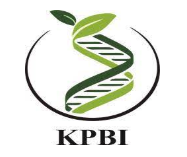PENGARUH STRATEGI KNOW-WANT TO KNOW-LEARNED (KWL) TERHADAP PENGUASAAN KONSEP SISWA PADA MATERI EKOSISTEM
DOI:
https://doi.org/10.15575/bioeduin.v8i1.2920Keywords:
Effects, KWL Strategy, Concept Mastery, EcosyAbstract
References
Anderson L. W & Krathwohl D.R. (2010). Kerangka Landasan untuk Pembelajaran, Pengajaran dan
Asesmen (Revisi Taksonomi Pendidikan
Bloom). Yogyakarta Pustaka Pelajar.
Arikunto, S. 2008. Dasar-dasar Evaluasi Pendidikan. Jakarta: Bumi Aksara.
Arikunto, Suharsimi. (2013). Dasar-Dasar Evaluasi Pendidikan. Jakarta: PT Bumi Aksara.
Campbell, Reece dan Mitchell. 2004. Biologi Edisi Kelima/ Jilid 3. Jakarta: Erlangga.
Carr, E. & Ogle, D. (1987). K-W-L Plus: A Strategy for Comprehension and Summarization. Journal of Reading, 30 (7), 626-631. Diperoleh 2 Mei 2014, dari http: //eric.ed.gov/ERICWebPortal.
Dahar, R. W. 2011. Teori-teori Belajar dan Pembelajaran. Jakarta: PT Gelora. Aksara Pratama.
Djamarah, Syaiful Bahri. (2011). Strategi Belajar Mengajar. Jakarta : PT Rineka Cipta.
Faudy, Amir. dkk, (2012). Pengaruh Strategi Know Want to Learn (KWL) Dan Minat Membaca Terhadap Kemampuan Membaca Intensif Siswa SMP Negeri Di Temanggung†(Jurnal Penelitian Bahasa Sastra Indonesia dan Pengajaran). Diperoleh 2 Juni 2014, http://portalgaruda.org/article.
Gulo. W. (2008). Strategi Belajar Mengajar. Jakarta: PT Grasindo.
Hamdani. 2011. Strategi Belajar Mengajar. Bandung: Pustaka Setia.
Hamruni, 2011. Strategi pembelajaran. Yogyakarta: insan Madani.
Hendrik, (2010), Uji mann-whitey (U-Tes) tersedia (onlein) : http://lady mh 89.files wordpress com. / / ladymh 89 files com/2011/08, Uji Man whitey I.pdf (diunduh pd juli 2014).
Huffman, L.E. (1998). Spotlighting Specifies by Combining Focus Questions with K-W-L. Journal of Adolescent & Adult Litaracy, 41(6), 470-472. Diperoleh 24 Juni 2014, dari http: // eric.ed.gov/ERICWebPortal.
Irwan, D. 2007, Prinsip-prinsip Ekologi Ekosistem, Lingkungan dan Pelestariannya. PT. Bumi Aksara: Jakarta
Isjono, 2011. Cooperative Learning Efektifitas Pembelajaran Kelompok ALFABETA: Bandung.
Jihad, Asep. Haris, Abdul. 2009, Evaluasi Pembelajaran. Yogyakarta: Multi Pressindo.
Kariadinata, Rahayu. 2011. Statistik Pendidikan Suatu Pengantar. Bandung: FTK UIN SGD Bandung.
Maulana. (2009). Memahami Hakikat, Variabel, dan Instrumen Penelitian Pendidikan dengan Benar. Bandung: Learn2live „n Live2learn.
Purwanto, Ngalim. 2013. Psikologi Pendidikan. Bandung: PT Remaja Rosdakarya.
Rahim, Farida, 2009. Pengajaran Membaca Di Sekolah Dasar, Jakarta: bumi aksara.
Riduwan, M. (2009). Dasar-dasar statistika. Bandung: Alfabeta.
Rustaman, Nuryani (2003).Strategi Belajar Mengajar Biologi. Bandung: IKIP. Jakarta.
Sagala, Syaiful. (2012). Konsep dan Makna Pembelajaran. Bandung: Alfabeta.
Sanjaya, Wina 2009. Strategi Pembelajaran Berorientasi Standar Proses pendidikan. Jakarta: kencana.
Sapari, Heri Busyaeri. (2013). Efektivitas Pendekatan Metakognisi Strategi KWL (Know-Want-Learned) Dalam Upaya Meningkatkan Kemandirian Belajar†(Tesis). (Skripsi Universitas Pendidikan Indonesia). Tersedia [online]: http://repository.upi.edu/pdf. [diunduh 2 juni 2014].
Slameto. 2010. Belajar dan Faktor-faktor Yang Mempengaruhi Belajar†Jakarta: PT Rineka Cipta.
Soemarwoto. Otto. 2004. Ekologi Lingkungan Hidup Dan Pembangunan. Djambatan: Jakarta.
Subana. (2000). Statistik Pendidikan. Bandung: CV Pustaka Setia.
Downloads
Published
How to Cite
Issue
Section
Citation Check
License
Authors who publish in Jurnal BIOEDUIN agree to the following terms:
- Authors retain copyright and grant the journal right of first publication with the work simultaneously licensed under a Attribution-ShareAlike 4.0 International (CC BY-SA 4.0) License that allows others to share the work with an acknowledgment of the work's authorship and initial publication in this journal.
- Authors are able to enter into separate, additional contractual arrangements for the non-exclusive distribution of the journal's published version of the work (e.g., post it to an institutional repository or publish it in a book), with an acknowledgment of its initial publication in this journal.
- Authors are permitted and encouraged to post their work online (e.g., in institutional repositories or on their website) prior to and during the submission process, as it can lead to productive exchanges, as well as earlier and greater citation of published work (See The Effect of Open Access).








